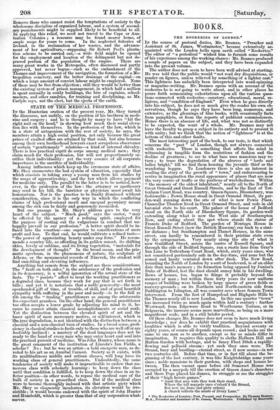STATE OF THE MEDICAL PROFESSION.
Ix the Hunterian oration of the present year, Mr. Skey turned the discourse, not unfitly, on the position of his brethren in medi- cine and surgery ; and he is thought by many to have "hit the right nail on the head," in showing how much their social eleva- tion lies with themselves. In the profession of the law, which is in a state of antagonism with the rest of society, he says, the members attain a high social position, not only because the great prizes of exalted office are attained by that road, but also because among their own brotherhood lawyers exact scrupulous observance of certain " gentlemanly " relations—a kind of internal chivalry. There is less practical esprit de corps among medical men ; they claim much for their profession, but will not proportionately sa- crifice their individuality: yet the very essence of all corporate importance is the sacrifice of individuality. Among influences which keep up the erroneous state of affairs, Mr. Skey enumerates the bad system of education, especially that which consists in taking away a young man from his studies by the usagc. of apprenticeship; and the law which allows payment for medicine only. The parallel to the latter is to be noticed, how- ever, in the profession of the law : the attorney or apothecary may send in his bill, the barrister or physician must await his honorarium. Nor is the practice to be finally dismissed without consideration, since it is the only way in which the conflicting claims of high professional merit and unequal pecuniary means among the sick can be fairly and generously reconciled. But one passage in Mr. Skey's address goes to the very heart of the subject. "Much good," says the orator, "may be effected by the agency of a refining spirit, employed for the purpose of rooting out the vulgarisms in conduct that un- happily prevail in our profession." A better spirit should be in- fused into the vocation—one superior to considerations of mere profit and loss. To that end, he would cultivate a refined taste— "the power of appreeia beauty under any form." He recom- mends a countay hfe, as ording in its golden sunset, its shifting skies, lovely or sublime, and its living vegetation, "materials for the development of thought." In the broad ocean, and the pris- matic spectrum, in the plue-nomena of nature, the sculpture of Athens, or the monumental records of Nineveh, the student will find ennobling and elevating influences. Anything but remote from the subject are these considerations. The "fault on both sides," in the aristocracy of the profession and in its democracy, is a wilful ignoration of the actual state of the facts. The " purists " affect to treat the working practitioners as a degraded class, because they work for pay that is set forth in bills ; and yet it is notorious that a noble generosity—the most openhanded gift of time, of trouble, of skill, and of good heartfelt sympathy with suffering in the poor and needy—is to the full as rife among the " trading " practitioners as among the aristocratic fee-expectant grandees. On the other hand, the general practitioner too often accepts a lower grade by adjusting his mind to it, be- cause he cannot attain classical accomplishments or social rank. Yet the distinction between the elevated spirit of art and the baser spirit of mere mercenary motive, or self-interest, which is Tv-true degradation, is not identical with the distinction between a classid and a non-classical tarn of studies. In a broad sense, profi- ciency in classical studies is facile only to those who are well off or are booktahly inclined : a mastery of the dead languages does not lie ready to the hand of every man who may enter heart and soul into the practical pursuit of medicine. Was John Hunter, whose name is the great ornament of the institution of Lincoln's Inn Fields, a scholar? No; but he was an artist—a bold energetic man, as de- voted to his art as an Annibal Canted. Society as it exists with its multitudinous middle and artisan classes, will long have its working class of general practitioners. Undoubtedly, the same tendencies of society will make it impracticable to endow that nu- merous class with scholarly learning : to keep down the class until that condition is fulfilled, is to keep down the class in an in- ferior position—in other words to pose the medical care of the bulk of society in a proscribe re
d class. But if the medical class were to become thoroughly imbued with that artistic piety which Mr. Skey so eloquently inculcates, its elevation would be irre- sistible; it would become endowed with the spirit of John Hunter and Humboldt, which is greater than that of any corporation what- soever.
























 Previous page
Previous page